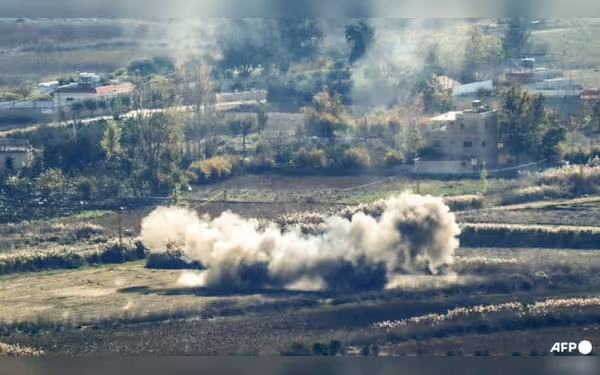Monday, December 23, 2024 06:24 AM
Israeli Military Strikes Hezbollah on Syria-Lebanon Border
- Israeli air force targets Hezbollah military infrastructure.
- Ceasefire agreement faces challenges amid ongoing tensions.
- Weapons confiscated during Israeli military operations in Lebanon.
 Image Credits: channelnewsasia
Image Credits: channelnewsasiaIsraeli military strikes Hezbollah on the Syria-Lebanon border, raising concerns over ceasefire stability and ongoing tensions.
In recent developments, the Israeli military has taken decisive action against Hezbollah, a militant group based in Lebanon, by targeting what it describes as "military infrastructure" along the Syria-Lebanon border. This operation, which occurred on Saturday, November 30, comes in the wake of a ceasefire agreement aimed at halting over a year of intense cross-border hostilities and two months of open warfare between Israel and Hezbollah.
The Israeli air force reported that it launched a strike on sites adjacent to border crossings that were allegedly being used by Hezbollah to smuggle weapons from Syria into Lebanon. According to the military's statement, this smuggling activity was taking place "after the ceasefire agreement went into effect," raising serious concerns about the stability of the truce.
In addition to the airstrikes, the Israeli military has been actively conducting searches in southern Lebanon. During these operations, soldiers reportedly confiscated weapons that were hidden in a mosque, further complicating the already tense situation. The ceasefire, which began early on Wednesday morning, was intended to facilitate the withdrawal of Israeli forces and the deployment of the Lebanese army and UN peacekeepers in southern Lebanon.
As part of the ceasefire terms, Hezbollah is expected to pull its forces back north of the Litani River, which is approximately 30 kilometers from the border, and dismantle its military infrastructure in the region. However, Israel has made it clear that it reserves the right to maintain "full military freedom of action" in Lebanon should Hezbollah violate the ceasefire or attempt to rearm.
This latest escalation highlights the fragile nature of peace in the region. While the ceasefire was established to bring an end to hostilities, the actions taken by both sides indicate that tensions remain high. The international community will be closely monitoring the situation, as any further violations could lead to a resurgence of conflict, impacting not only the countries involved but also the broader Middle Eastern landscape.
The ongoing conflict between Israel and Hezbollah serves as a stark reminder of the complexities of regional politics and the challenges of achieving lasting peace. As both sides navigate this delicate situation, the hope remains that dialogue and diplomacy will prevail over military action, allowing for a more stable and secure future for all involved.













